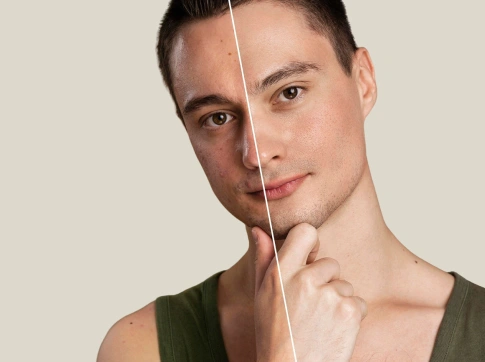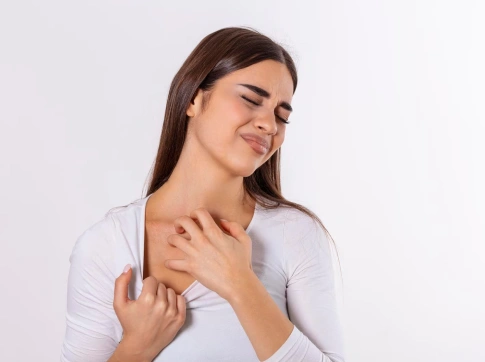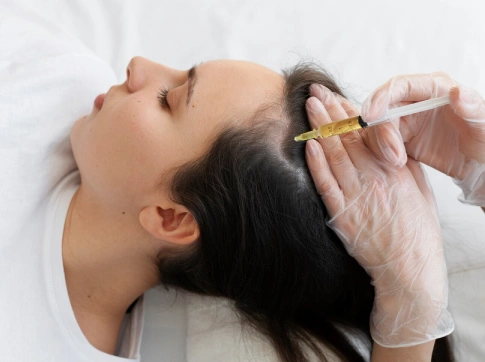Dandruff vs Seborrhoeic Dermatitis: Why Your Scalp Itches
20 Nov 2025 Posted By Skinlogics
It is very common to have an itchy scalp. But not knowing what it is caused by leaves one distressed and confused about what to do for relief. Dermatologists in Noida highlight that one might think of dandruff, but it could be seborrheic dermatitis. This situation is faced by many across the globe.
Although both dandruff and seborrheic dermatitis can cause an itchy scalp and other similar symptoms, note that they are two different scalp conditions. Here with this information one can self-differentiate between dandruff and seborrheic dermatitis and act accordingly to calm your itch.
How is Dandruff Different from Seborrheic Dermatitis?
| Features | Dandruff | Seborrheic Dermatitis |
| What is it? | It is a mild form of seborrheic dermatitis, causing only dry flaking of scalp skin. | It is an intense, inflammatory skin condition that affects extremely oily skin. |
| Symptoms |
These symptoms get better with environmental changes and a proper haircare routine. |
These symptoms exacerbate with exposure to cold, dry air or due to excessive stress. Often, the signs appear and disappear, and the condition is chronic if left untreated. |
| Causes and Triggers |
The condition is the result of excess sebum (oil) production on the scalp. The sebum is the food of the Malassezia yeast, naturally existing on the scalp skin. As Malassezia feeds on scalp sebum, the sebum breaks down into oleic acid, which causes irritation and itching. The body responds to the oleic acid by speeding up cell renewal. As a result, clumps of dead skin cells form, which are visualised as dandruff flakes. Dry, cold weather, use of hot water to wash hair, use of harsh shampoos, and excessive stress can all trigger dandruff. |
The condition is the result of a stronger immune/inflammatory response to the irritation caused by Malassezia yeast growth. |
| Affected Areas | The condition is restricted to the scalp skin. | The condition affects only the oily areas- the Scalp, T-zone of face, ears, chest, and back. |
| Treatment Options |
Dermatologists recommend:
The treatment goal is to restore the natural moisture of the scalp and hair. |
Dermatologists recommend:
The treatment goal is to reduce oil production and control the growth of Malassezia. |
Why Both Dandruff and Seborrheic Dermatitis Cause an Itchy Scalp?
Dandruff and seborrheic dermatitis both make the scalp itchy, because of:
- Irritation caused by the overgrowth of Malassezia, the scalp fungus/yeast
- Excess of sebum production in scalp skin helps Malassezia thrive
- Low-grade inflammation of the scalp skin
- Scalp dryness or sensitivity to hair products.
The Final Thoughts: Find the Culprit for Your Itchy Scalp with Skinlogics, Skin Clinic in Noida Help
Struggling to have a calm, healthy scalp? First, you need to identify the reason behind your itchy scalp, and that is solely possible with the help of the right dermatologist.
Skinlogics Clinic has top-rated dermatologists who help people with itchy scalp get accurately diagnosed and be appropriately treated.
FAQs on Dandruff and Seborrhoeic Dermatitis
What causes my itchy scalp?
There are many potential causes, like scalp dryness, contact dermatitis, seborrheic dermatitis, scalp psoriasis, scalp fungal infection, folliculitis, nutritional deficiencies, head lice, or nerve issues. Consult with a doctor to know the exact cause.
When should I see a dermatologist for an itchy scalp?
Visit a dermatologist if scalp discomfort/issues are persistent or worsening, despite home remedies, moisturising efforts, and over-the-counter treatments.
How should I confirm having scalp dermatitis?
The only way is by seeing a dermatologist and getting the scalp thoroughly examined and medical records reviewed.
How can I reduce scalp redness and flakes?
Change of haircare products and haircare routine, along with healthy lifestyle choices, may help. But it is always better to ask a dermatologist for tailored scalp care.
What is the best treatment for dandruff?
An anti-dandruff shampoo and adoption of a good scalp and haircare routine are the preferred remedies for dandruff.
Which is the most effective treatment for seborrheic dermatitis?
Topical antifungals or corticosteroids, along with lifestyle modifications and proper scalp care, can help manage seborrheic dermatitis. To get a tailored, best treatment plan, see a dermatologist.
Can I relieve my itchy scalp with at-home remedy?
Some proven effective ways are keeping the scalp skin well-moisturised and nourished with some oils, avoidance of hot head shower/bath and use of fragranced or skin-irritating cosmetics, and stress management.
Are dandruff and seborrheic dermatitis contagious?
No, both conditions are not spreadable or catchable from physical contact. These conditions affect only people with dry or oily skin, reacting to oleic acid produced by Malassezia.
Can dandruff cause hair loss?
Hair loss isn’t a direct cause. But the excessive scratching of an itchy scalp can damage the hair roots and cause the hair to fall out.
Schedule a consultation at Skinlogics Clinic and feel relieved with the best seborrheic dermatitis and dandruff treatment in Noida!



